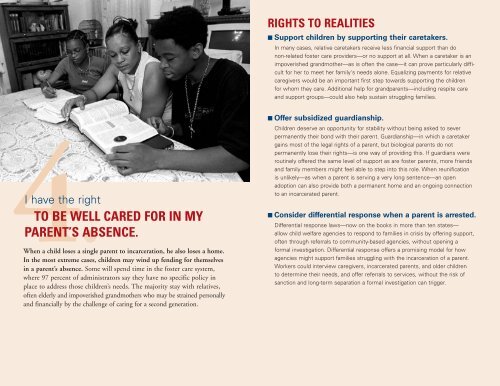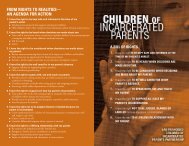RIGHTS TO REALITIES■ Support children by supporting their caretakers.In many cases, relative caretakers receive less financial support than donon-related foster care providers—or no support at all. When a caretaker is animpoverished grandmother—as is <strong>of</strong>ten the case—it can prove particularly difficultfor her to meet her family's needs alone. Equalizing payments for relativecaregivers would be an important first step towards supporting the childrenfor whom they care. Additional help for grandparents—including respite careand support groups—could also help sustain struggling families.4.I have the rightTO BE WELL CARED FOR IN MYPARENT’S ABSENCE.When a child loses a single parent to incarceration, he also loses a home.In the most extreme cases, children may wind up fending for themselvesin a parent’s absence. Some will spend time in the foster care system,where 97 percent <strong>of</strong> administrators say they have no specific policy inplace to address those children’s needs. The majority stay with relatives,<strong>of</strong>ten elderly and impoverished grandmothers who may be strained personallyand financially by the challenge <strong>of</strong> caring for a second generation.■ Offer subsidized guardianship.<strong>Children</strong> deserve an opportunity for stability without being asked to severpermanently their bond with their parent. Guardianship—in which a caretakergains most <strong>of</strong> the legal rights <strong>of</strong> a parent, but biological parents do notpermanently lose their rights—is one way <strong>of</strong> providing this. If guardians wereroutinely <strong>of</strong>fered the same level <strong>of</strong> support as are foster parents, more friendsand family members might feel able to step into this role. When reunificationis unlikely—as when a parent is serving a very long sentence—an openadoption can also provide both a permanent home and an ongoing connectionto an incarcerated parent.■ Consider differential response when a parent is arrested.Differential response laws—now on the books in more than ten states—allow child welfare agencies to respond to families in crisis by <strong>of</strong>fering support,<strong>of</strong>ten through referrals to community-based agencies, without opening aformal investigation. Differential response <strong>of</strong>fers a promising model for howagencies might support families struggling with the incarceration <strong>of</strong> a parent.Workers could interview caregivers, incarcerated parents, and older childrento determine their needs, and <strong>of</strong>fer referrals to services, without the risk <strong>of</strong>sanction and long-term separation a formal investigation can trigger.
“Am I in thisworld by myself?”Antonio, 23, spent 11 years in foster care wile his mother was inand out <strong>of</strong> jail and prison on drug-related charges. At the time <strong>of</strong>this interview, he was working as a peer counselor.When I was four years old, my mother started doing drugs. She usedto be in and out <strong>of</strong> jail, and then she started going to prison when Iwas seven years old. That’s when we first got taken from her. Her friendstook me to Social Services, dropped me <strong>of</strong>f, left me there.I've been in about 18 different group homes since then, and three or fourfoster homes. I don’t care how bad whatever we were going through, I stillwanted to be with my mom.At the foster homes they would try to talk to me and I would say “yes”and “no.” I didn’t tell them anything else, because I was so hurt about it.One foster home I was in, I called the lady there my grandmother, ‘causeshe took care <strong>of</strong> me. She always made sure that I got in touch with mymom. Even if my mom was locked up and tryin’ to call collect, she couldcall there. My grandmother knew that mattered in my life.The other places, they didn’t care. There was only a couple <strong>of</strong> people thatI lived with that actually took me to see my mom.In the group homes, they knew my mom was in jail and they would justtell me, “Oh, it’s gonna be alright.” But they don’t know how I feel becausethey’re not going through it.1/2HALF <strong>of</strong> all children withincarcerated mothers are caredfor by grandparents.At school kids would ask where my mom was at and I’d say, “jail.” Somekids would be like, “Oh, that’s cool.” The good ones would be like, “Oh,that’s all bad. Your mom’s crazy.” When Mother’s Day used to come aroundand people would be chillin’ with their mothers, kids would say, “What areyou gonna do on Mother’s Day? Oh, I forgot, you don’t have a mother.”Maybe I didn’t have a family, but whenmy daughter was born, I knew for surethat was my family. I knew I could makesomething better out <strong>of</strong> my life. Whenshe was born, I cut all my friends loose. Istarted working at a warehouse, picking up50-pound bags for $6.50 an hour.My daughter is always smiling. She’s alwayshappy. I love having a family. Before, Iwould think, “OK, do I got a family, or amI in this world by myself?” Even to this day,there’s that fear that I can lose my family,‘cause I’ve already lost my first family.2/3Now that I have kids, I don’t know whyanyone would want to leave a little preciousthing like that by themselves. I don’t understandwhy they would let that happen.I don’t care what I have to do in this world,if I have to do everything right, I will, justto make sure that my daughter gets everythingthat I didn’t have.Amanda, 16All my life my mom’s been in andout <strong>of</strong> jail for stealing, drug possession,forgery. I never met my father.He’s been in and out <strong>of</strong> prison too.Since I was four, I’ve pretty muchlived with my grandma. I used toalways cry when my mom wouldleave. She’s been in and out somany times that my heart doesn’tallow me to cry any more.Nearly TWO THIRDS <strong>of</strong>children being raised by singlegrandmothers live in poverty.I don’t like telling my friends that mymom’s locked up because thenthey’re like, “Oh, well, that family’sall bad. They’re low class.” They’lltalk behind your back.When they see that children don’thave fathers and the mothers areincarcerated, they need to givethe grandmothers more financialsupport. My grandmother gets SSIand welfare gives her 140 dollars amonth for four children. I don’tknow if she’s going to have anymoney for nextmonth’s rent.My mom’salways callingfrom prison.My grandma’sphone bill is like 500-something rightnow. My grandma takes the calls‘cause she says it’s her daughter.Besides financially, I think my grandmaalso needs someone there for her,‘cause it’s not right that she’s alwaysstuck inside the house taking care<strong>of</strong> us. She needs to get out.



